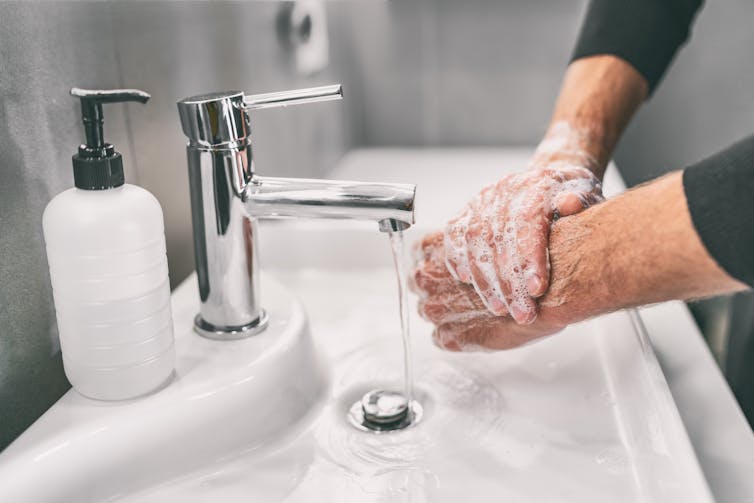COVID virus fragments have been detected in sewage in my area. What does that mean and what should I do?
- Written by Cobus Gerber, Associate Professor, University of South Australia
If you’ve heard COVID-19 virus fragments have been detected in sewage in your area, you might be wondering: does that mean someone in my suburb has COVID-19? What should I do?
Firstly, the most important thing to do is follow your state health department’s advice.
Fragments of the virus that causes COVID-19 were found in the Allambie Heights sewage network in Sydney, via samples taken on April 22 and April 26. Fragments were also detected in the Marrickville sewage network (via a sample taken May 3).
According to NSW Health, people in those areas should monitor for symptoms and “if you have even the mildest of symptoms (even if it appears to be a cold), get tested and self-isolate immediately.”
Viral fragments were also recently detected in Melbourne sewage.
But when it comes to wastewater monitoring for COVID-19, there’s a lot of probability involved. It doesn’t necessarily mean someone in your suburb definitely has COVID.
Here’s how to put the news into context.
Read more: Sewage testing is no magic bullet in our fight against COVID-19. But it can help
There’s a risk of a false positive
Remember, it is possible for testing to produce a false positive. The test itself can produce a wrong result and detect virus fragments when in fact there were none.
Or, it could be detecting virus fragments from a person who was infected in the past and was in hotel quarantine but is now out in the community and no longer infectious. They may just be shedding virus fragments, even though they no longer pose a risk.
It could be someone who passed through
There’s also another way to think about it: it’s possible a person from a completely different area came through your suburb, stopped at a cafe or at someone’s house, used the toilet and excreted fragments of the virus into the catchment. Then they went back home to their own suburb.
If virus fragments are showing up in just one or two samples, there is no way to know for sure if it’s a local resident who excreted it or if it was someone passing through.
If it happens on a daily basis via samples taken over many days, however, then it is more likely to be a local person.
A negative result could be wrong, too
Wastewater testing isn’t perfect. Just because COVID fragments have not shown up in samples from your suburb, it does not mean for sure your suburb is entirely COVID-free, either.
In fact, negatives are more likely than false positives. It’s possible the infectious rate in that area is so low it falls below the limit of the detection method.
The sampling method, in most cases, is not continuous so there’s always a chance a flush of a sample by an infected person was not detected because there was no sampling taking place at that moment. It’s all about probability.
Fragments, not whole virus
Usually, when a positive result is recorded it means fragments of virus have been detected. A viable, active virus is not excreted, to a large extent, in faecal material. When it is, it has a very short life span. Usually what is detected is RNA fragments characteristic of the SARS-COV-2 virus. The risk of catching COVID from sewage is relatively low. The main risk is from from sharing a surface or being in a confined space with an infected person.
 Be ultra careful about sharing surfaces, physical distancing, wearing a mask, washing hands and using hand sanitiser.
Shutterstock
Be ultra careful about sharing surfaces, physical distancing, wearing a mask, washing hands and using hand sanitiser.
Shutterstock
Be alert but not alarmed
A lot of people think that if virus was detected in a certain sewage network then it must mean someone in that community has COVID. That is possible; but it may also turn out not to be the case.
If COVID virus fragments were detected in the wastewater in my area, I would be alert for symptoms and I would also take necessary precautions. I’d be ultra careful about sharing surfaces, physical distancing, wearing a mask and using hand sanitiser.
It may be nothing but, at the same time, I would just follow the health advice.
As I have argued in previous articles on The Conversation, sewage testing is no magic bullet in our fight against COVID-19, but it can offer helpful clues.
Read more: Flushing is our next weapon against COVID-19, if you're happy to have your sewage scrutinised
Authors: Cobus Gerber, Associate Professor, University of South Australia




